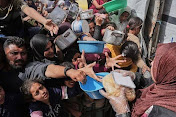On the first day of his second term, Trump issued a
record-breaking 26 executive orders, and in the weeks that followed, he
added more than 100 additional orders alongside other memorandums and
proclamations. Some have been entirely positive, while others have been
downright eyeroll-inducing, such as renaming the Gulf of Mexico and
declaring the day the order was signed a national holiday.
The trillion-dollar military budget seems consistent with
Trump’s hawkish foreign policy. Both of Trump’s electoral victories reflected a
mandate to finally stop subsidizing foreign conflicts and end America’s forever
wars. Trump has, at least, withheld funding for Ukraine, though his approach
seems more an effort to cater to Putin than to achieve peace.
Elsewhere, the president has doubled down on America’s
support for Israel’s destruction of Gaza, has threatened war with Iran, and has
commenced a horrible bombing campaign against Yemen. Just as in his first term,
when he neglected to fulfill his promise to withdraw troops from Afghanistan,
Trump is again proving to be a war-happy commander in chief.
President Trump’s second term threatens to be even more of a
disaster than his first in many arenas, particularly trade and foreign policy.
His immigration measures are consistent with his campaign promises, but his
lack of concern for due process and rule of law should be concerning to even
the most ardent supporters of border security.
Trump’s approach to spending seems an improvement over his
first term, but is nonetheless disappointing after what appeared to be a
promising start with DOGE.
The silver lining to Trump’s first 100 days is that he is
providing a positive counterweight to the left’s growing radicalism in the
culture wars, as demonstrated by his education policies.
*Christopher J. Calton is the Research Fellow in
Housing and Homelessness at the Independent Institute.






